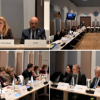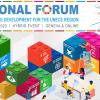News
Displaying Results 1 - 24 of 24
As the international community marks 75 years since the adoption of the groundbreaking Universal Declaration of Human Rights, UNECE calls for commitment and practical measures from governments and all stakeholders in the region to uphold the human rights of all persons including those with…
Global goals – just like regional and national goals — can only be achieved if we work together. This is a reason that revitalizing partnerships is at the heart of the Sustainable Development Goals (SDGs).
With this in mind, under the umbrella of the Regional Collaborative Platform, regional…
Delegations from over 40 countries in the wider European region convened in Geneva on 19-20 October to review progress towards the goals adopted by the landmark 1994 International Conference on Population and Development (ICPD) and discuss priorities for the future.
The two-day conference,…
The International Conference on Population and Development (ICPD), held in Cairo in 1994, set a bold new vision of the relationships between population, development, and individual rights and well-being. It recognized that population was not about numbers, but about people, and that individual…
On today’s World Elder Abuse Awareness Day, focused on Gender-Based Violence in Older Age: Policy, Law and Evidence-based Responses, UNECE calls for commitment and concrete measures to end violence against older women in the pan-European region and North America.
A challenge in all regions …
Young professionals from industry, academia, and civil society came together to discuss and explore solutions for sustainable resource management at the UNECE Resource Management Week 2023. Hosted by the UNECE Resource Management Young Member Group (RMYMG), the highly interactive session provided a…
Young people are emerging as crucial champions for the achievement of the sustainable development agenda of countries in the UNECE region. The ideas and perspectives of new generations, who are acutely aware of the environmental challenges that the world faces, can help shape the policies and…
In an increasingly digitalized world, full and equal participation in society depends on modern technologies. From work and education to healthcare and staying connected with loved ones, nearly every aspect of daily life has to some degree gone “online”. The critical role of digital technologies in…
Innovation and Technology, which is the focus of this year’s International Women’s Day, presents powerful opportunities for gender equality, and offers welcome hope at a time of great challenges for women’s empowerment. In fact, the regional progress report on the Sustainable Development Goals (…
This year’s Regional Forum on Sustainable Development (Geneva, 29-30 March 2023) is taking place against the background of multiple crises: the lingering aftermath of the COVID-19 pandemic; the war in Ukraine; food, energy and cost-of-living crises; economic downturn; and financial vulnerabilities…
The 61st Commission for Social Development concluded yesterday with the adoption of a resolution calling for acceleration of the implementation of the Madrid International Plan of Action on Ageing (MIPAA). The Commission session concluded the fourth global review and appraisal of MIPAA, which…
Meeting the goals of the UN Agenda 2030 for Sustainable Development and overcoming the challenges of sluggish economic growth, social exclusion and environmental degradation requires the contribution of both men and women. More-over, many sustainable development challenges affect women more…
The heads of national statistical offices participating in the Conference of European Statisticians have (CES) welcomed UNECE’s new Guidance for measuring the impact of the Covid-19 pandemic on women and men.
The COVID-19 pandemic continues to disrupt many aspects of daily life. The…
As an established convenor of standards developing organisations, UNECE encourages the integration of a gender perspective, providing practical steps for organisations to advance women’s full and effective participation in standards and standards development. With the objective of strengthening…
The transition to a decarbonized energy sector is a critical step for keeping global warming below 2°C. To succeed, countries will need to phase out, or at least substantially limit the use of coal. While the benefits of the green transition are numerous, it will require a deep structural shift…
Millions of people are experiencing the severe impacts of climate change, through unprecedented extreme weather episodes and more frequent disasters. According to the Chair of the Intergovernmental Panel on Climate Change, Hoesung Lee, its latest report, released last week, “is a dire warning about…
As early as 1995, the Beijing Platform called for the active involvement of women in decision making; the integration of gender concerns and perspectives in policies and programmes with sustainable development; and the establishment of mechanisms at all levels to undertake a gender impact…
The COVID-19 pandemic and the lockdowns it triggered have affected mobility patterns in most countries and brought to the fore many issues that had not received enough policy attention until now.
For instance, the fear of the virus and the search for social distancing led to a historic decline in…
Gender mainstreaming means integrating gender equality perspective at all stages and levels of policies, programmes and projects. All policy levels are equally important, as gender mainstreaming has to be applied throughout the whole society. Mainstreaming gender at local level is crucial since at…
Decarbonizing transport and mobility remains a critical policy challenge, for which we must seize the recovery from the COVID-19 pandemic as a unique opportunity to accelerate progress. Decarbonization is one example of an issue where transport, health, and environment all meet – an intersection…
Achieving equality between women and men is a core goal of governments and the international community. The frameworks that guide us towards this goal—the Sustainable Development Agenda and The Beijing Platform for Action, among others—emphasize that for equality to be achieved, women and men must …
Whilst environmental degradation affects everyone on the planet, it affects the lives of women and men in different ways. Implementing environmental policies with gender considerations in mind can be more effective to understand target groups better, gain greater acceptability of policies and…
New guidance published by UNECE’s Conference of European Statisticians offers support to national statistical offices to better communicate their statistics about gender equality. The guidance, developed by a task force of experts from across the region, focuses on six themes: the gender pay gap;…
ICTs are a powerful tool to alleviate barriers faced by women entrepreneurs. The impact of the COVID-19 and the restrictions imposed on doing business worldwide since the beginning of 2020 have made the need to use ICTs imperative for the survival of small businesses. The digital platforms provide…























